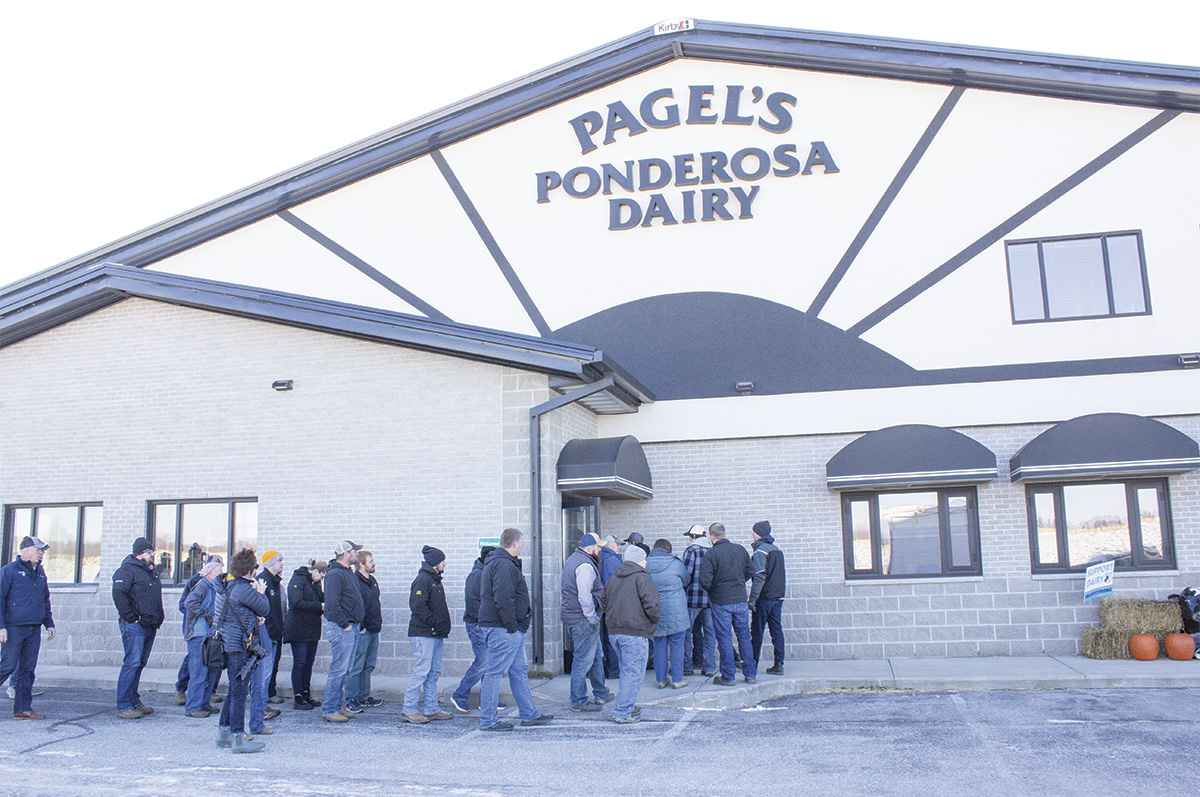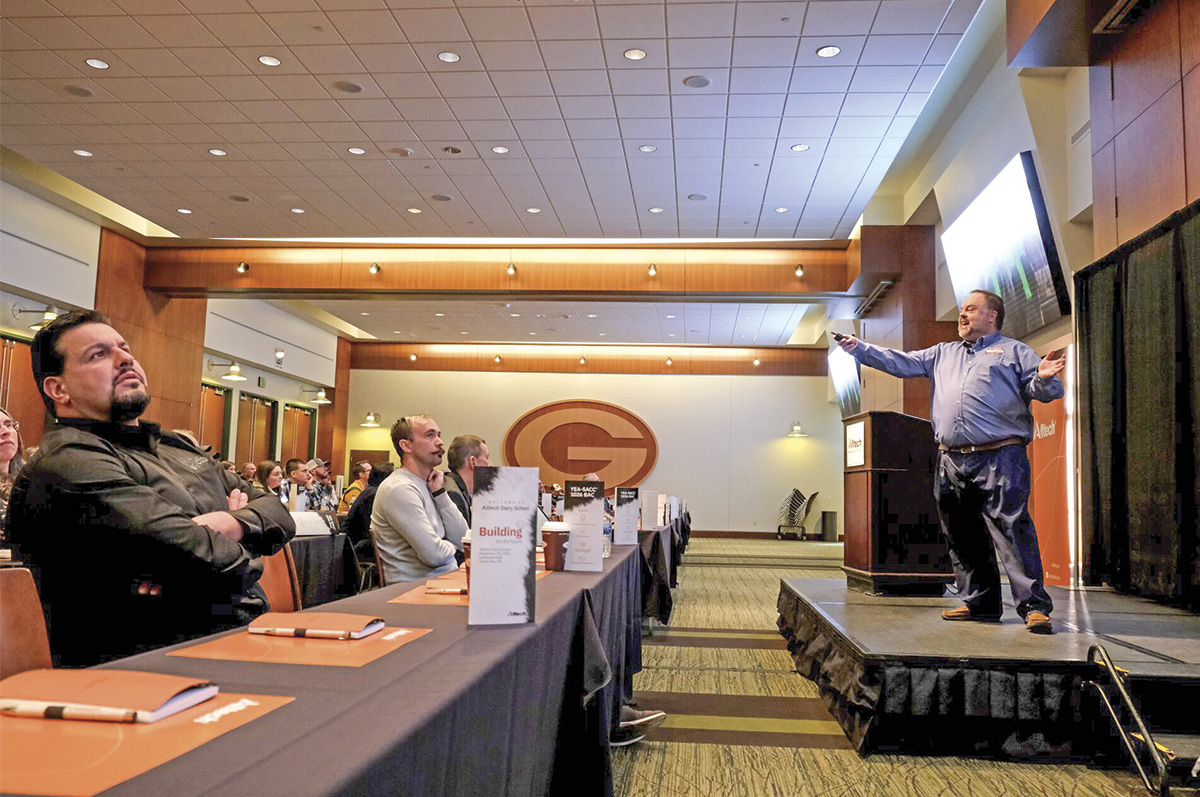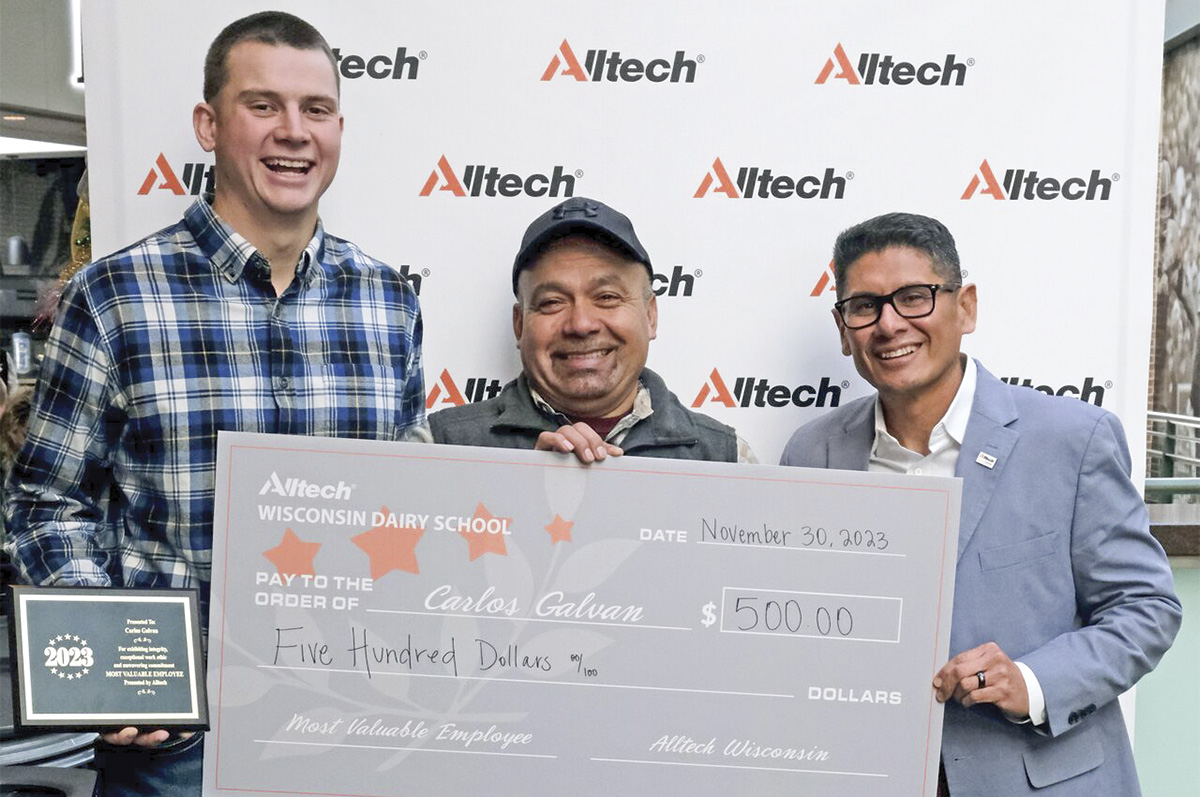For its 20th anniversary, the Alltech Dairy School welcomed more than 230 attendees, including dairy farmers, nutritionists, veterinarians and other technical experts to Lambeau Field in Green Bay, Wisconsin.
Held Nov. 29-30, this year’s event focused on the past 20 years of dairy. The first day included two farm tours and a welcome dinner, while the second day featured formal presentations on topics ranging from precision feeding and on-farm technology to the evolving carbon credit and dairy markets.
Farm tours
The first stop on the farm tours was Pagel’s Ponderosa Dairy in Kewaunee County, Wisconsin. The dairy encompasses six milking parlors on five different sites with three additional heifer facilities. Calving occurs at two of the facilities, while confirmed pregnant cows are housed at the more remote farms.
Ryan Schultz, feeding manager, explained the farm has been breeding for Holstein-Jersey cross cows for better cheese yields and feed efficiency. “Our intakes are 5 percent lower,” Schultz said, noting that results in less manure and less cropping.
Currently, they are breeding heavy for replacement animals to fill one of their growing sites. They also do a lot of embryo work with a portion of the herd enrolled in a surrogate program. Remaining animals are bred Angus and calves are sold as day olds.
The home site uses its double-20 parlor for hospital, fresh cows and large-framed animals. This allows the rotary parlor to function at maximum efficiency, Schultz said. The rotary parlor wheel also automatically changes its rotation speed based on the group being milked.
The farm has an anaerobic digester and sells its compressed natural gas (CNG) to a nearby pipeline. “Income from our digester has helped with cash flow through the low milk prices,” he said.
Next on the tour was Kinnard Farms where Lee Kinnard is a fifth-generation dairy farmer. The home farm milks first-lactation cows in a parallel parlor. A new cross-ventilated barn across the road is equipped with a 100-stall rotary parlor and houses the second-lactation-and-older animals, as well as the maternity pens and two heated rooms for newborn calves.
Mark Schlaefer, feed manager, said the farm recently built a new feed center, which it started using in September. It went from two mixer trucks running 11 hours a day to two delivery trucks running a total of six hours a day.
“We lost feed when mixing it outside,” Schlaefer said. Now the haylage and corn silage piles are near the feed center, which has 17 bays inside for storing commodities like corn gluten, wet distillers and ground corn, as well as two stationary mixers.
The farm is now adding a roof over the bunker silos at the home site with plans to raise calves there. They currently partner with other dairies in eastern Wisconsin and raise all newborn calves until 1 week old when they are sent to a heifer feedlot in Colorado.
It is also building a manure system to clean the digestate from the anaerobic digester onsite. It will produce commercial quality fertilizer and distilled water.

Kinnard: Sustainability
In addition to hosting a farm tour, Kinnard presented his farm’s actions for sustainability at one of the breakfast breakout sessions on Thursday, Nov. 30.
“Sustainability is what we built our business on,” he said. “It’s what our parents, it’s what our grandparents taught us on the farm over the years.”
Kinnard listed God, family, community and business as their four priorities. “We try to keep our priorities straight,” he said.
Kinnard spends a lot of time on education and bringing the next generation to the farm. He hosts field days where third graders come to the farm to learn about soil health.
To strengthen the community, he helped form a volunteer first responder squad since parts of his community are 10 to 15 miles away from the nearest EMS service.
Kinnard was also an integral part of launching an area youth apprenticeship program with seven schools to promote the trades and jobs in rural communities.
With both fishermen and farmers in his family heritage, Kinnard said they’ve been protecting water in the region since the 1850s.
The farm has been using no-till and cover crops since the early 80s and since 2000 they’ve had cover crops on 90% of their ground going into winter each year.
“We are literally creating new soil,” he said, noting that over 40 years they’ve increased the organic matter by 2%.
Panel: Securing workers
Agriculture faces many challenges when it comes to labor, including immigration laws, not enough skilled workers, high turnover and unclear expectations.
At another breakfast breakout session, Jorge Delgado, Alltech, moderated a discussion with Jesus Ramirez, HR Group USA, and Miguel Rangel-Mendez, Optimum Dairy Consulting, on how the dairy industry can address some of these challenges and the available resources to help dairy producers.
Rangel-Mendez said many industries are suffering from a lack of employees, not just agriculture. Often other industries have an HR department that can help with finding skilled workers, whereas family farms may not.
“When you are hiring skilled employees, first you need to know what you need,” he said. When you don’t have that, especially when bringing someone from another country, it becomes a problem once they are here and faced with a completely different set of expectations.
Ramirez added, “Be clear. Be real.” Tell the potential employee about the job and the workplace. Explain the level of difficulty and if conditions could be hot or cold. Let them know the pay rate, explain there will be taxes taken out and that they will have to pay for healthcare. This can be very different than the situation they are coming from.
“That is what we call the onboarding process,” Rangel-Mendez said. “So everybody knows what they are getting into.”
Other ways they suggested to reduce turnover are to develop leaders in your workforce, say “good morning” and, when visiting the parlor, lend a hand by washing machines or handing out towels.
“I never step in a parlor without helping the milker. Why? Because that’s a cultural thing,” Rangel-Mendez said.
Resources like the TN, H2-A, H2-B and EB-3 visa programs can be used to secure foreign workers and, in some cases, gain permanent residency. Hiring a recruiter who is familiar with these programs and can help explain your expectations is one way to help gain more skilled labor.
Horsager: Milk marketing
Kent Horsager, president of CSC Ag, works in markets and is active in trading milk, cheese, butter and feed commodities. He discussed how to apply technology and information with analytics to protect and manage farm finances.
“From a marketing plan standpoint, we look at things in expected value. ... Not trying to forecast price, but trying to forecast value,” Horsager said.
The baseline program is the Dairy Margin Coverage (DMC) offered through the USDA Farm Service Agency, which has a positive expected payout over time. “That is kind of an automatic. Everybody who can participate in that would do well to do that,” he said.
The next favorable expected value is the insurance products – Livestock Gross Margin (LGM-Dairy) and Dairy Revenue Protection (Dairy-RP) offered by the USDA Risk Management Agency. These programs pay out about 30%-40% of the time.
“It’ll not pay out anything for a number of quarters, and then it’ll pay out significantly more than what you’ve invested,” he explained, showing the data over a period of time.
Horsager said they utilize a tool to analyze whether to purchase Dairy-RP based on class pricing or component pricing with the outcome changing based on the day you decide to purchase it.
Bewley: Cow-centric technology
Dr. Jeffrey Bewley, Holstein Association USA, shared his experiences with a large variety of cow-centered and farm monitoring technology.
“I really believe that when you look at the modern dairy farm, it’s a scientific marvel in what we have been able to do scientifically in the last century to improve things like dairy cow nutrition, dairy cow genetics, dairy cow reproduction, cow comfort, etc. With that, I think that analytics and how we use data is our next big, scientific breakthrough,” Bewley said.
While some of the technologies today are interesting and it is impressive that we can measure such things, he said, “If the data isn’t something we can do something with, [that technology] does not matter.”
Other pitfalls to watch for are investing in more than the return it can provide, comparing data across farms as different systems can provide different results and focusing more on detection than prevention measures.

Bockhahn: Carbon credits
Jennifer Bockhahn is a partner in Concord Agriculture Partners, a newly formed company to build bridges between farmers who are doing great sustainability work and companies that want to make claims on it.
In this world of carbon tracking and trading, farmers are being presented with contracts that include carbon rights.
“Carbon rights are a big deal, because it means you’re essentially signing away your right to claim a lower emission,” Bockhahn said.
This typically occurs with offsetting, which is “where you’re taking emissions and you’re selling them to someone who’s outside your value chain,” she explained.
“Insetting is where you can share the claim throughout the value chain. So your processor [or end user] can make the claim on a lower emission milk product,” Bockhahn added.
Currently, offsets are more valuable than insets, but by working with companies, Bockhahn is looking to bring more value back to farms with financial incentives for reducing emissions while keeping the credits within the dairy supply chain.
Krogstad: Feeding strategies
Dr. Kirby Krogstad from Ohio State University explained gut health challenges can be prevented by following the fundamentals of feeding.
“Providing access to feed around the clock is one of the most important things to manage the health of the animal,” Krogstad said.
“It’s also one of the easiest things you can monitor,” he added, noting a simple deer camera mounted in the corner of the barn can show if the cows hit their desired refusal rate and when they hit that point.
Other feeding strategies he is a proponent of include preprocessing dry forages, offering yeasts and other direct-fed microbials as insurance, avoiding highly fermentable sources of starch, providing adequate forage peNDF and offering free-choice dry hay to fresh cows for a few days.
Murphy: Transitioning a team
To close out the program in the storied Lambeau Field, Mark Murphy, president of the Green Bay Packers, talked about his nearing retirement and some of his career accomplishments.
Murphy played for the Washington Redskins where he served as the team’s player representative and began making connections across the league.
“I learned it’s better to build bridges than to burn them,” Murphy said.
One of the ways he has built bridges in his 16 years with the Packers was by using the philosophy of management by walking around.
“When you go into their office, on their turf, so to speak, you’d be amazed at some of the things that you can learn and how it can benefit the organization,” he said.
Alltech Wisconsin announces dairy farm Most Valuable Employee Award winner

Alltech Wisconsin presented the 2023 Most Valuable Employee (MVE) Award to Carlos Galvan of Weltzien Farms in Arcadia, Wisconsin. This award recognizes the value of a dairy farm employee with an exceptional work ethic who exhibits integrity and who engages in their responsibilities on a dairy farm in the region, which includes Wisconsin, Minnesota and northern Illinois. Nominations are made by a farm manager, dairy owner, farm consultant or nutritionist based on qualities such as perseverance, honesty and integrity. The finalists were honored during the annual Alltech Dairy School on Thursday, Nov. 30, in Green Bay, Wisconsin.
“Alltech is proud to honor Carlos as this year’s Most Valuable Employee Award winner for his hard work and dedication to Weltzien Farms for the past 17 years,” said Jorge Delgado, manager of the Alltech Training, Talent Development and Retention Program for Dairy Workers (Alltech T²R Program). “This award is designed to recognize the people behind the cows and their exceptional work ethic and integrity, and Carlos is most deserving of this honor.”
Galvan was nominated by his employer, Collin Weltzien of Weltzien Farms. He joined the operation as a milker when they made the shift to milking 180 cows three times per day. Galvan still milks the morning shift, and his role has evolved to that of a “jack of all trades,” as he handles many tasks on the farm.
Weltzien shared that Galvan is an expert with the parlor equipment and often manages the cleaning, repair and maintenance projects. He also commonly mixes feed, helps to feed calves and helps with field work wherever needed, from hauling manure to raking hay, hauling silage and even running the chopper from time to time. Galvan is also very skilled in the shop. He services most of the tractors and implements, and will perform repairs on tractors and machinery in the freestall barn and in the feed room.
The other finalists honored during the Alltech Dairy School included Autumn Wozny from University of Wisconsin – Platteville Pioneer Farm and Pete Poet from Abts Champion Dairy.
“The best employees add value to the dairy by thriving in their roles, maintaining their responsibilities, creating a safe and positive work environment for their co-workers and speaking highly of their employers, both on and off the farm,” Delgado said. “When dairy farms and their employees develop long-term relationships and celebrate each other’s hard work, everyone involved reaps valuable benefits.”
For more information about the Alltech Wisconsin MVE award, contact Alltech Wisconsin.











